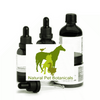(Members Only)
Educational Overview
Kidney/Bladder Stones
Kidney and bladder stones aren’t just a human issue—many animals can develop them too. These stones form when minerals in the urine clump together, creating hard, rock‑like deposits.
Different species form different types of stones. Dogs, cats, rabbits, guinea pigs, and even reptiles can be affected. Factors like diet, hydration, and underlying health conditions can influence how easily stones develop.
Animals with stones may show signs such as straining to urinate, frequent trips to the litter box or yard, blood‑tinged urine, or discomfort around the abdomen. Some animals hide their symptoms, so subtle changes in behavior matter.
Stones can irritate the urinary tract and, in some cases, block the flow of urine. That’s why attention to hydration and appropriate nutrition play an important role in prevention.
Understanding how stones form helps us protect the animals we care for and support their long‑term health.
* Natural pet botanicals are not intended to replace veterinary care or medication. Our formulas are offered as an alternative health support for your animal's condition and not as a cure. All our oral supplements are to be consumed voluntarily by your animal in food, treats or liquid.
SET OF
Educational Purposes
Traditional & Historical Associations
This set has been traditionally considered in cases described as kidney or bladder stones. Historically, remedies of this kind were associated with supporting natural elimination, easing discomfort, and encouraging urinary balance.
-
Sludgy bladder syndrome occurs when normal calcium crystals are retained in the bladder. Practitioner consideration:
-
Calcification of the bladder wall in cats refers to calcium deposits in bladder tissue, often linked to chronic inflammation, infection, or irritation. Signs may include difficulty urinating, blood in the urine, or frequent urination. Veterinary evaluation is essential for diagnosis and treatment.
-
Stone Ease 224-1 formula with ReMag Magnesium solution 284 (to support calcium balance and urinary flow).
-
For antimicrobial and flushing support, combine Bladder Balance 319 with Herba Flush 224-2 or use as separate bottles.
-
Stone Ease 224-1 formula may also be considered.
-
Kidney calcification (stones) or sludgy bladder may benefit from minerals such as magnesium and potassium. Potassium, in particular, has been noted for helping to maintain balance in calcium distribution (keeping it from depositing in arteries or urine). A urine test may show high calcium levels, creating conditions where stones can form.
-
Struvite stones and bladder infection often appear together. In dogs, struvite stones form in alkaline urine, while calcium oxalate stones tend to form in acidic urine. Bladder infections caused by Staphylococci bacteria almost always produce struvite stones.
Formulated with plant-based ingredients selected for their gentle role in supporting overall balance and wellbeing
SET OF 2
1. Stone Balance 224-1 formula 50ml
2. Herba Flush 224-2 Mix 200ml
Contains:
Formula 1.
Magnesia phosphate (Mag Phos 6X, 1M)
Barberry (Berberis vulgaris 6X, 1M)
Wild Liquorice (Sarsaparilla 1M)
Seven-barks (Hydrangea arborescens 6X, 12C, 1M)
Cleavers (Galium spp 1M)
Mineral Phosphorus (Phosphorus 30X, 1M)
St Mary’s Thistle (Silybum marianum 1M)
Shepherd’s purse (Bursa pastoris 6X, 30C)
Wild Yam (Dioscorea villosa 1M)
Copper mineral (Cuprum Met 1M)
Potassium Chlorate (Kalium Chloricum 1M)
Calcium Carbonate (Calc Carb 200C, 1M)
Juniper Berries (Juniperus communis 6C, 1M)
Bladda Clear 15 formula
Calcarea Phosphorica (Calc Phos 6C,30X)
In 20% USP alc. in purified water.
Formula 2.
Juniper (Juniperus communis)
Chanca Piedra (Phyllanthus niruri)
Agrimony (Agrimonia eupatoria)
St Marys Thistle (Silybum marianum)
in purified water & 30%-40% USP alc.
CANINE DIET
If you’re dog is a vegetarian, then consuming too many foods that are High in oxalates is not good.
Felines, of course cannot be vegetarians, they must consume 90% of fresh meat daily to stay healthy.
Oxalate, also called oxalic acid, is a compound that your dog's body produces. You can also find it naturally in many food sources, including fruits, vegetables, nuts, and grains.
Small amounts of oxalate and calcium are normally present in the urinary tract and typically do not cause any issues.
They've found certain vegetables with chocolate, the highest oxalate content:
(AVOID)
- Leafy greens like spinach contain many vitamins and minerals, but they're also high in oxalates. ...
- Soy Products....
- Almonds
- Navy Beans....
- Dates…
- Almonds and cashews, pecans, peanuts
- Peppers
- Wheatgerm, brain.
- Grits
- Baked potatoes with skin
- Beets
- Okra
- Bran cereals and shredded wheat cereals
- Raspberries
- Stevia leaf - sweeteners
- Sweet potatoes
Need more advice or have more questions? Contact us for a FREE consultation with one of our fully qualified practitioners.
These statements are for general wellbeing and educational purposes only. This product is not intended to diagnose, treat, or prevent any disease. Always seek veterinary or professional advice for specific health concerns.
DISCLAIMER
The statements made regarding these products have not been evaluated by the Food and Drug Administration. The efficacy of these products has not been confirmed by FDA-approved research. These products are not intended to diagnose, treat, cure or prevent any disease. All information presented here is not meant as a substitute for or alternative to information from your health care practitioners. The Federal Food, Drug, and Cosmetic Act require this notice.









